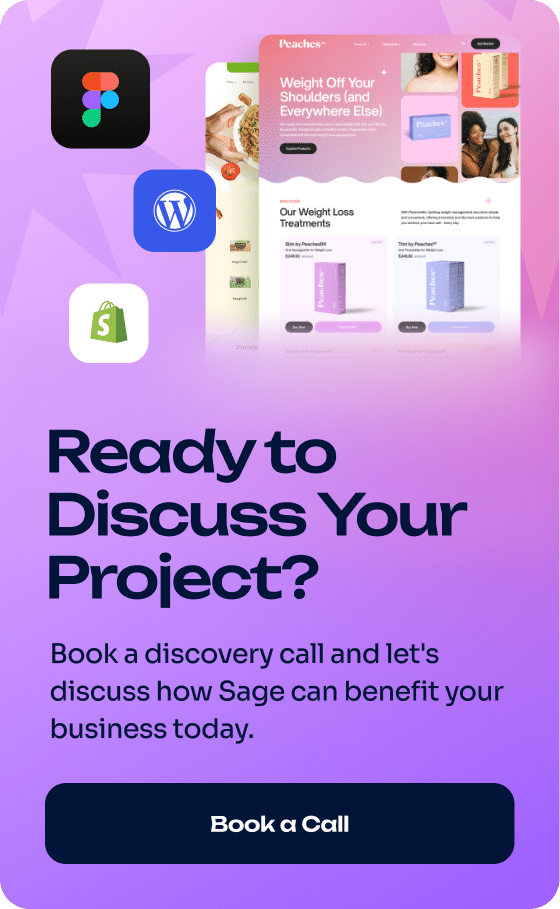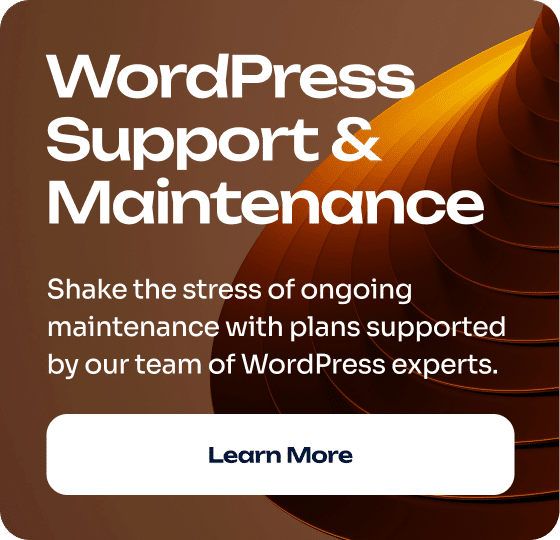In this post, we’ll be sharing 20 questions that will help you find the right web design company and start a meaningful conversation with them.
20 Questions To Ask A Web Design Company
1. How Long Have You Been Designing Websites?
Generally speaking, the longer your web designer has been in business, the better. You don’t want to pay someone who is inexperienced who will use your project as a guinea pig.
Learning how to navigate unexpected challenges takes experience, and it isn’t something a beginning web designer can necessarily learn from reading textbooks or watching YouTube videos.
So, where does that leave you?
» MORE: The Sage team has 100+ years of collective experience. Read more about us.
2. Do You Outsource Your Web Design or Development Work?
If you’re paying someone to design and develop your website, you certainly want to make sure they’re not outsourcing the whole project to somebody else and just collecting a fee.
If they are, you might as well go directly to the source and save yourself some money.
There’s nothing wrong per se with outsourcing certain parts of a design, but it’s all about transparency.
You should understand how much your agency does themselves versus how much they outsource, and they should be open about it.
Does Sage Digital Agency Outsource?
We recognize that every client has unique needs. If a task falls outside our direct purview, we have a curated list of highly talented industry experts to whom we can refer.
Our primary aim is to offer you the best, whether it’s directly from us or from our trusted network.
3. Who Oversees Your Web Design Projects?
Before you hire a web design company, find out who’s steering the ship. That’s a top priority.
Questions to ask include:
Does this person have a background in managing web design projects? Do they collaborate with a team? And perhaps most importantly, how do they communicate?
Keeping in mind their style of communication will set the tone for the entire project, so make sure it aligns with your expectations.
How Sage Communicates Your Web Design Project Details
At Sage, we proactively communicate with you throughout your entire project.
We also utilize project management tools internally, and we document absolutely everything. This makes it easy for our project manager to keep you updated with detailed and accurate information.
» MORE: Get to know your project manager by scheduling a meeting with Alex
4. What Are Your Web Design Milestones?
Every web design company has different milestones that it prioritizes in its workflow. As a client, you’ll want to have a clear idea of what those are so you’re not left in the dark, waiting for certain things to get done.
If your preferred web design agency can’t provide clear and specific milestones, find another designer.
You don’t want to wait three months, six months, or a year for your project to finish while you have no idea what’s going on.
What Are Some Specific Web Design Milestones?
Every designer will have different milestones. One designer, for example, might focus on building a sitemap, while another will prioritize wireframing and prototyping from the get-go.
With that said, your web design company should set reasonable milestones that don’t leave you waiting for weeks or months before progress is made.
» MORE: From concept to reality: How we design your website in 5 steps
5. As A Web Design Company, Do You Guarantee Your Work?
This is such an important question since, in many cases, when a web design company finally hands off a project to you from its development side, they’ll say, “Hey, this project is done.”
But it might not actually be done. What if you don’t have all the images you need, for instance? Or what if you discover, after the site is live, that your visitors are having a hard time using it?
You don’t want a situation where your site is maybe done, maybe not.
Even worse, you don’t want your web designer to then turn around and charge you money to fix a problem they should have taken care of from the beginning.
Avoiding Hidden Costs: An Example of Why Your Web Designer Should Guarantee Their Work
Take it from us. The last thing you want is to work with a web designer who strings you along and charges you extra for every minor adjustment. This can happen when your web designer doesn’t guarantee their work.
For example, we have a particular client we work with who is a nationally known musician, and here’s what he told us recently:
“Usually, the designers in the past that I’ve worked with will take a deposit, promise the world, pick up the phone, and act like everything is great.
“But once that deposit has been received, you can’t get them on the phone, and everything that you ask them to edit becomes additional costs when it was supposed to be a website that was already finished.”
Guaranteeing Your Web Design Project’s Deliverables
When it comes to guaranteeing deliverables for your web design project, your guarantees need to be broken down by your chosen web design company.
It’s very important for both sides to be protected from the start. You don’t have to sign a crazy contract with 20 pages of fine print, but:
You need something in writing that outlines exactly what everyone’s expectations are and what steps you can take if those expectations aren’t met.
Any web design company that is reputable will certainly stand behind its work in this manner.
» MORE: How To Reduce Your Risk of Hiring The Wrong Website Designer
6. Do You Follow Up After the Web Design Project is Finished?
This is quite a helpful question to ask when discussing project guarantees with your web designer.
Once the project’s finished, is it just handed off? Is there any more communication?
At a bare minimum, there needs to be a clause in whatever contract you have that includes 30 days’ worth of additional maintenance or bug fixes as needed.
The reason this is important is that:
Once you go live, there are usually things that are missed, broken, or otherwise need adjusting, and someone needs to be able to go in and fix them.
What a horrible feeling to pay for your website and then get stuck with yet another bill because the scope of work wasn’t laid out before the project began.
Your Web Design Company Is Responsible For Communicating Effectively
In every project, the onus is on the web design company to be very specific and say:
“This is what you’re getting. This is what we’re doing for the price that you’re paying. And this is the timeline that we’re going to be developing it in.
“And we are going to do whatever is necessary to ensure that you as our client are happy and that you have a functioning website at the end of this.”
Without this type of communication, you, the client, are put in a bad position.
Setting Design Expectations Helps Solve Scope Creep
Additionally, setting clear expectations prevents scope creep, as it keeps you from overtaxing your web designer, which can lead to rushed work, time delays, and compromised design quality.
7. What Should I Do If I’m Unsure About My Web Design Project Needs?
From the perspective of a web design company, if you aren’t sure what your web design project needs, then the focus should be on doing the right type of onboarding.
Let’s say a client comes into a situation and says, “I want a website.”
And we just say, “Okay, great. We’ll get started and have a prototype for you on x date.”
That’s just not enough.
Your web design company needs to ask you questions like:
- Who’s going to provide the content?
- Who’s going to provide the images?
- Where is your graphic content coming from?
- What functionality do you want for your website?
- What’s the core purpose of the site?
- Is your website informational?
- Are you selling something?
- Are you trying to get people to call you?
- Who are your ideal clients?
Your chosen web designer needs to be clear on all of these topics, and if they’re not asking you these questions up front, then this should definitely raise a red flag.
Your Website As A Minimum Viable Product
By the way, there’s nothing wrong with starting off with a minimum viable product (MVP).
This can help you avoid paying excess money for work that you don’t actually need, and it can reduce the time it’s going to take to get a finished product.
When you build on WordPress, WooCommerce, or Shopify, you can always scale your site later once you know exactly what you need.
Web Design Project Phases and the Future of Your Website
Scaling your website at a later development phase is helpful for business websites that are a little more complex. Maybe you’re running an eCommerce site, or maybe you have a lot of content pages. These are situations in which additional development would make a difference.
We often say to clients, “Let’s develop Phase One. Here’s what that will look like.” Then we’ll ask, “In your opinion, what does Phase Two look like over the next few months? What does Phase Three look like six months to a year down the road?”
8. What If I Don’t Have Any Web Design Files?
If you’re creating your website on a shoestring budget and you don’t have UI or web design files, then you will need the developer to do that work for you.
Regardless of the starting point, clarity is your best ally here, and when going into your project, you should have something that you can point to and say, “This is exactly how I want my site to look and function.”
This isn’t about being stingy; it’s about mutual understanding. Without a concrete direction, your project could become an endless slog, which isn’t fair to either party.
9. Two Related Questions: (1) Do You Provide Referrals From Past Clients? (2) Do You Have Examples of Similar Projects You Have Worked On?
We have mixed thoughts on asking these questions because your chosen web design company should be able to provide you with examples of websites it has built. But there is a greater possibility for tunnel vision when you base your web design on someone else’s website.
For example, if you see a website for lawyers that you want to emulate, chances are you’re going to end up with a cookie-cutter template or a close copy of someone else’s design concept.
There are only so many ways that your web designer is going to be able to design your website once they show you a portfolio design example and you agree to the design.
Beware of The Web Design Company That Uses Pre-Made Templates
Before you agree to any project, ask your web designer if they plan on using a pre-made template. Many lesser-experienced web designers do use templates, which they just duplicate and slap your logo on.
A skilled web design company with a more varied portfolio of websites, by contrast, can give you a site that’s actually unique to your business.
But a potential disadvantage is they might not have experience in your specific niche, especially if they’ve mastered only one or two website genres. Once you know their skillset, you’ll be able to make an informed decision about whether you want to hire them.
10. Do You Take The Time To Learn About My Business and Competitors?
Any reputable web design company will conduct research about your business and should ask you the following questions:
- Who are your competitors, and what are they doing well in the marketplace?
- What types of goals do your clients usually have?
- What industries are your clients in?
- Are there industry-specific issues with your business that we should know about?
Research like this separates the good designers from the not-so-good since a web designer has to understand what you need. No research plan on the part of your web designer is a major red flag.
If your web designer doesn’t understand your business, how are they going to build a web design that is compelling to your audience?
11. What Other Services Do You Offer as a Web Designer?
When selecting a web design company, it’s helpful to ask what it offers beyond just web design.
A designer that is only focused on the design aspect of building websites may not understand how to provide certain benefits, such as effective ad placements or on-page sales strategies for upselling your products and services.
Integrating Facebook and Google Ads into Your Web Design
For example, if Facebook or Google Ads are going to be part of your strategy, you’ll want to build them in.
Your ads will need to factor in pixel placements and event tagging to make sure you don’t have elements that prevent certain ad platforms from tracking your site correctly.
Avoid Web Designers Who Are Spread Too Thin
With all this in mind, it’s essential that your chosen web design company isn’t spreading itself too thin either.
While diversity in services can be advantageous, if your designer is juggling web design on top of something random like billboard designs, there’s a risk that their web design might just be a secondary offering.
Seek an agency that genuinely prioritizes web design.
Note: Most clients build out their websites to achieve the following goals:
- They want more leads
- They want more downloads
- They want to give their users more information
- They want to sell a product
- They want more phone calls
Can your web designer help you achieve this?
» MORE: Explore our web design services
12. What Happens If I Don’t Like My Web Design?
What if you’ve paid money to a web design agency, everything seems to be going well at first, but then it turns out that you don’t like the design?
This really goes back to planning. If you go into your project with a clear plan of what you want, then you’ll have milestones you can adhere to.
Milestones Alert You If Your Web Design Project Runs into Problems
With the right milestones in place, you should be able to spot problems with your web design project. Maybe you find out that the color scheme is wrong. Maybe the overall design is not what was originally discussed or envisioned.
At any of these points, you can still pivot.
But once the site’s done, you almost have to start tearing apart the backbone or the foundation to rebuild it. This is an issue.
Establishing A Starting Point For Your Website’s Design
To avoid major design problems that manifest later down the road, we start by saying to our clients, “Show me examples of sites that you love.”
Because that gives us an idea of a starting point. If we don’t ask this question, how will we know what our clients want?
Maybe they want a site that’s completely opposite from the way we even build sites.
We don’t like seeing situations where web developers say, “Oh, we’re going to build you up to five pages based on what we think is best, and you have three changes and no more than that.”
That’s nonsense.
If you’ve hired a web designer to develop something, then it’s their job to do what is right and necessary to ensure that you’re happy.
You’re most likely not an outlier of a client who asks for 1,000 changes. That’s obviously not acceptable.
But in most cases, so what?
PS If you’re a web designer reading this:
Roll up your sleeves and spend a few hours in order to do exactly what your client needs so they have the best chance of being successful!
13. How Long Will My Web Design Project Take?
A savvy client should ask, “When am I getting a full draft of my website?”
If the answer from your web design company is—let’s go with 30 days from now—you as the client should then add the following:
“Okay, great. At what point will I start to receive a discount if I don’t get the draft?”
Web Design Project Timelines Should Be Upheld As Much As Possible
If a professional web design firm says, “You are going to get the following from us at such and such time,” then there should be no deviation from that.
Obviously, there are genuine problems that can cause a project to take a wrong turn, such as a non-responsive client. I’m not talking about those types of scenarios.
But in general, hold your web designer to their promises. If you offer too much wiggle room, then they might get complacent.
A Lack of Clarity Makes Web Design Projects Difficult
Complacency is an issue, but when both sides are not on the same page, that’s when a web design project can really go sour.
More times than not, when we are on our initial calls with new clients, a lot of them complain about working with other web design companies that are terrible at communicating.
Common Complaint
The most common complaint we receive from people who come to us for help is how long another company took or how three or four months went by without any sort of finished product being delivered.
The Length of Time Before You See Your Website’s Wire Frame
So, what’s a reasonable timeframe to expect at least a glimpse of your website’s wireframe or backend?
We believe a range of one to four weeks is reasonable.
But we’re not talking about two or three months to see a draft of a standard WordPress site. That’s not right. Something’s wrong with that picture.
» MORE: More insights on mistakes to avoid when hiring a web design consultant
14. Will My Site Work On Desktop, Tablets, and Phones?
Our response to this question is very simple: “Yes, but we put mobile first.”
Your site has to look great on mobile before anything else. This is because, in most cases, 50% or more of your traffic will come from mobile devices.
Direct To Consumer Brands Are Mobile Heavy
Amazingly, for many direct-to-consumer brands, it’s common to see 70% to 80% of people coming to you through mobile.
So, if your site’s not mobile responsive, it’s not going to perform well.
15. What Do I Need To Provide You With Before You Get Started?
Okay, let’s say you’ve moved past all the questions above, and as the client, you’re ready to get started with your web design project.
You have decided that X firm is the company you’re comfortable with. They seem like they can create the vision you want, they have the resources you need, and the numbers work out.
Now what?
Usually, this is where the biggest holdup starts since, as the client, you need to be able to provide logos, product imagery, access to hosting, and more.
The best solution here is to plan ahead and give your web designer everything they need as early on as possible. You can ask them for a list of items.
16. How Does Your Web Design Onboarding Process Work?
Every web design company follows a unique process. At Sage, we send out a link to an onboarding form, which has 25 or 30 questions on it that help us understand your business and what your goals are.
Your answers then go straight into our project management tool so that we can refer to them as needed.
17. Do I Own My Design and Website Once It Is Completed?
Yes!
Side Note About Website Ownership and Web Hosting:
Although you fully own your website, understand that your hosting company is where all your data is stored. So, if you happen to hire Joe Schmoe as a host, and he’s having a bad day, he can turn off access to your website.
Thus, it’s extremely important to make sure you have a backup of your site as well as cPanel access. That way, if there’s some problem, it can be reset somewhere else.
18. If I Need A Domain Name or Hosting, Do You Set That Up?
Could we purchase a domain for you through a GoDaddy account? Absolutely! However, it’s crucial that you’re registered as the owner of your domain name.
Remember, when you register a domain via platforms like GoDaddy, it’s more like a lease. Fail to renew, and you risk losing your domain.
As for hosting, we offer top-notch managed VPS hosting. Not only is the speed outstanding, but we also ensure our clients have access to their backups.
19. How Do You Handle Ongoing Website Updates and Maintenance?
How we handle updates for your website depends on you. If you have technical abilities and want to supervise your site, then of course, you can get involved with updates and site maintenance.
Don’t Have Technical Skills or Don’t Have The Time?
If you don’t know how or can’t devote enough time to maintain your site, then it’s best to hire someone knowledgeable to stay on top of it.
Sage Digital offers ongoing website support & maintenance with dedicated customer service to keep your site in top condition.
A WordPress website in some ways is like a car. There are many things that work in concert together to keep it running. For this reason, you’ll want to hire a trustworthy website “mechanic” to ensure that your plugins, core, theme, etc., are all updated properly.
20. Do You Have Good Reviews?
Asking potential web designers about their reviews can unveil truths about their reliability, professionalism, and the quality of their work.
Have they consistently met the expectations of past clients? Are there any recurring complaints or issues? A solid track record of positive feedback will help put your mind at ease.
By the way, we’re pretty proud of our track record. If you’d like a glimpse into our clientele’s experiences with us, take a moment to skim through our Google reviews.
Your Dream Design Awaits! Talk to Our Experts Now!
Sage Digital Agency is where beautiful visual design meets flawless function.
Want to know more?






